Students bring history alive with Colonial Fair
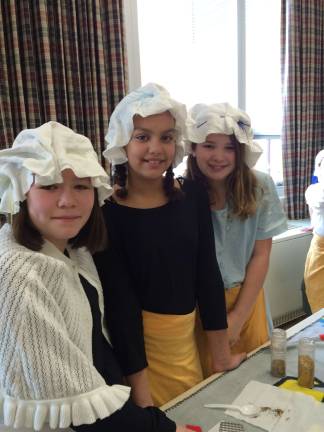
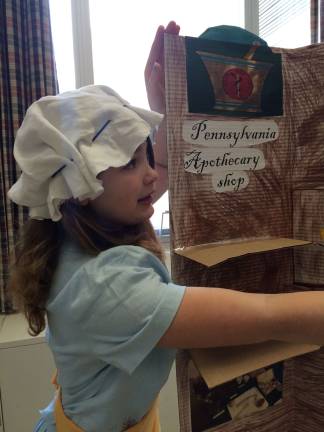
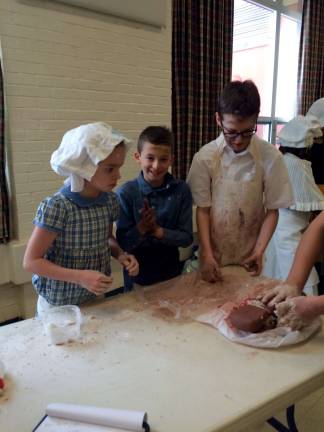
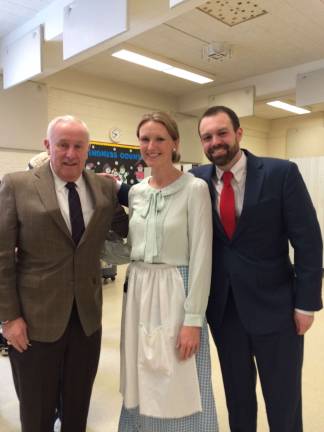
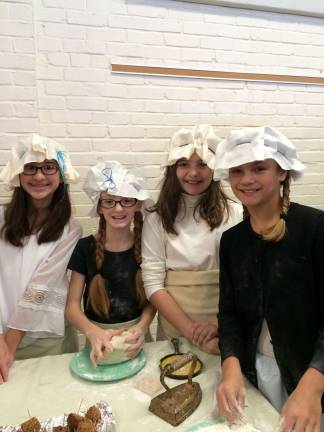
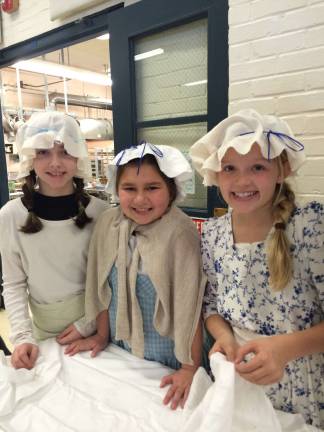
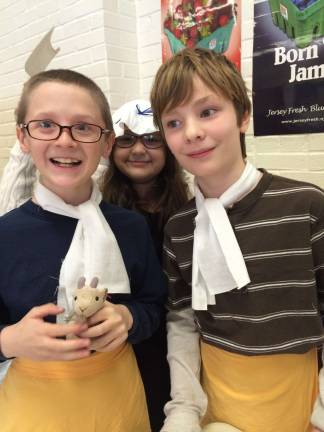
By Laurie Gordon
STILLWATER — The Stillwater Township Elementary School cafeteria was transformed into a Colonial courtyard last Wednesday as fifth grade students took on the roles of Colonial tradespeople and took visitors back in time. The students fully embraced the challenge to stay in character and even used British accents to explain their trades and how they'd come to their respective colony from England.
The Colonial Fair concept got its start across the county, in Sparta, in 2008 when Jessica Steffens was teaching fifth grade there. Now the sixth grade Ancient Civilizations and fifth grade American History teacher at Stillwater Township Elementary School, the Colonial Fair concept came with Steffens and has evolved. “A few of the history teachers had done something like this but on a much smaller scale,” Steffens said, “I decided to make it something in which the parents could come and be a part of, and the students could really show off their knowledge of Colonial Period.”
And show it off they did. Every single student stayed in their role as a character from the Colonial period for the entire duration of the fair, articulately explaining to visiting parents, students, teachers and administration what their “trade” was and showing how they did it. They even explained how they'd “come to America,” and had manuals and other props to use. There were 13 different trades represented among the 13 original American colonies.
“In the beginning of the unit we researched various colonial surnames from the time period. The students loved choosing real names of original settlers to the New World,” Steffens said, “As far as the trades and groupings, I really left that up to them. They had no trouble finding their groups and then we focused on their interests and what they thought they would like to research.”
“I'm really proud of the students and teachers,” said Interim Superintendent Dr. George Petty, “This is one many superb extra activities that exists here at the school. I am totally impressed with how fun and different this is and it's a pleasure to experience things like this with the students and teachers.”
Regarding the students role playing, Steffens said, “That is something that has actually grown along with the fair. The first few times I held the fair years ago, the children would stand there stiffly and read more of a presentation from their research. I remember going home and thinking one evening how neat it would be for them to actually immerse themselves into the character that they had studied and present it from their point of view, as the colonial character. It was like a spark was lit in each child, even the most reserved child loved playing their parts. It's really something to see.”
The students were very astute about technology and how it “didn't exist” in Colonial times. To this end, they role played to the point of — in a serious voice with a British accent — asking visitors what their cell phone was and some even hying away at having their picture taken pretending they didn't know what a camera or cell phone was.
Emily Popek, Marah Whitby and Carissa Roycroft's Colonial names were Charoltte, Patience and Phoebe, respectively. Their trade was school teachers. “If the children don't follow The Golden Rule, we use the whispering stick,” Popek explained. “The Golden Rule is very important,” Whitby added pointing to a list they had made. Andrea Nykazza (Lewis) and Lilly Miller (Abigail) were printers. “We use these special tools to smudge the ink,” Miller said as she demonstrated. “This is a very important process we use for printing,” Nykaza added, “And It took us a long time to get to America. We were on the boat for five years.”
“The biggest challenges putting this together was time constraints,” Steffens said, “There is much to do to prepare for this event, but the children were so eager to make everything just right, they offered to bring a lot of their material home to add finishing touches...even on weekends.”
Steffens said, “In the beginning of the Colonial Unit, I always ask the students to raise their hands if they are excited to learn about this time period. Maybe I will see two or three hands go up. You would think that my biggest reward when organizing something like this would be the actual fair, the students' using their accents, the parents that lovingly come to support their children, or the happiness that fills the room. Actually, my reward is the hour after we meet. After the fair and I look around my classroom and ask them, 'Well, who wants to learn more about Colonial Life and the events that lead to our American Revolution?'and every single hand shoots into the air. That's my reward.”
Back at the Fair, Aiden VanHook , Daniel Manser, Jackson Choma and Molly Riva were busy acting out their roles as brick makers complete with clay that resembled bricks and morter. “It's a lot of work,” Riva said, “We make 2000 bricks a day.” Over at the Apothecary, Julia St. Clair (Kathrine) explained “the spices we use are very important,” and nest door a Tavern Keeper, Clare Schwartz (Clara) said, “We help travelers by giving them a place to sleep and a warm meal.” Wyatt Wright was part of the Lamb Family with the Colonial name of Salmon. “We make wheels out of wood and iron,” he said.
Hailey Foster (Laysa) was busy describing how she and her Colonial family made dresses. “We live in Connecticut but we came from England,” she said. Daniel DeStafano (Clara), and Gina Kropp (Elizabeth) were by her side. “Why are you wearing your husband's britches?” many of the children asked of women wearing pants.
All of the children were in Colonial-esque clothing complete with long skirts and bonnets for the girls. Ashley Smith (Suzanne) was a baker along with her Colonial sisters Ariana Begraft (Abigail), Aniella Morgan (Cecelia) and Ashley Gordon (Elizabeth). “We came to the colony of Virginia and learned to bake from our parents,” Smith said. Gordon said, “The fair gave us a chance to really be part of history and it was a great way to learn by actually living it.” St. Clair added, “It was fun acting out the role of a Colonial character and having a Colonial name.”